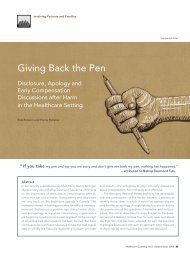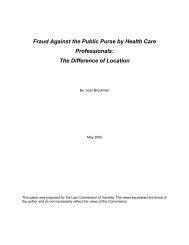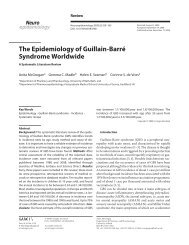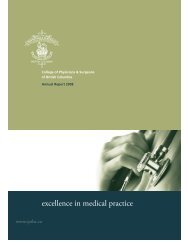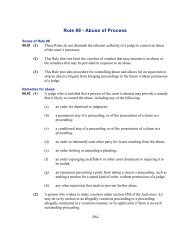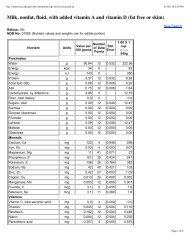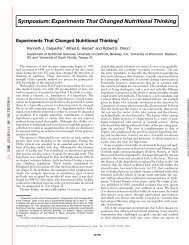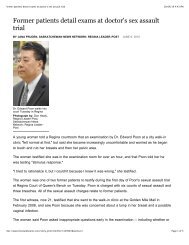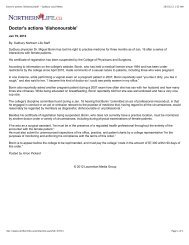mutual defence organization - TUUM EST
mutual defence organization - TUUM EST
mutual defence organization - TUUM EST
You also want an ePaper? Increase the reach of your titles
YUMPU automatically turns print PDFs into web optimized ePapers that Google loves.
General Counsel s report<br />
GENERAL COUNSEL'S REPORT<br />
’<br />
DEFENDING PHYSICIANS IN<br />
CHALLENGING TIMES:<br />
MEDICO-LEGAL ISSUES CREATED BY SHRINKING<br />
HEALTH CARE RESOURCES<br />
Every year the CMPA responds to an increasing number of questions<br />
from members about issues in their day-to-day work. Many inquiries are<br />
related to the current health care environment in Canada. Have you faced<br />
any of these questions?<br />
• I am obliged, as a condition of my hospital privileges, to be on call<br />
in the emergency department. What are my obligations when a<br />
patient presents with a possible acute surgical abdomen in the<br />
absence of surgical or anesthetic backup?<br />
• How should I proceed when an urgent C-section is required and the<br />
anesthesiologist on call is occupied with emergency surgery at the<br />
hospital's other site, which is approximately 10 minutes away?<br />
• The waiting list at our hospital for cardiac procedures is too long.<br />
Do I have a duty to disclose this to patients and/or to advise them of<br />
the possibility of obtaining faster treatment elsewhere?<br />
• I am a specialist and head of the department at a large tertiary care<br />
centre. I am the only one in the department with expertise in a<br />
particular sub-specialty and receive many referrals. What is the<br />
extent of my liability between the time the referral is received and<br />
the patient is seen, often a period of three to four months?<br />
• Most family physicians in our town have closed their practices to<br />
new patients. This leaves many members of the community with<br />
their only access to care through the emergency department. Who is<br />
responsible for these "orphaned" patients once they are discharged?<br />
This is only a small sample of the dilemmas plaguing physicians in<br />
Canada today. Restructuring, funding cutbacks and cost containment are<br />
all words that reflect the reality that doctors are still being asked to meet<br />
the standard of care with fewer and often inadequate resources. How<br />
should physicians respond when they are faced with making treatment<br />
choices that are affected by cost considerations and the ever-changing<br />
environment for the delivery of health care? What will be their liability<br />
when long waiting lists, the lack of specialists or unavailability of<br />
diagnostic tools impair the appropriate course of care?<br />
10<br />
The standard of care<br />
The standard of care expected of a physician is still often described by<br />
reference to this extract from a case decided in 1956:<br />
Every medical practitioner must bring to his task a reasonable degree<br />
of skill and knowledge and must exercise a reasonable degree<br />
of care. He is bound to exercise that degree of care and skill which<br />
could reasonably be expected of a normal, prudent practitioner of<br />
the same experience and standing, and if he holds himself out as a<br />
specialist, a higher degree of skill is required of him than of one<br />
who does not profess to be so qualified by special training and ability.<br />
Courts determine the appropriate standard of care through the<br />
evidence of experts who function with similar training and in a similar<br />
practice setting as the defendant physician. However, Courts have tried to<br />
be cautious about applying the standard in the abstract and will usually<br />
consider the circumstances surrounding a specific fact situation. Although<br />
the test of the "reasonably prudent physician" is objective in nature,<br />
certain factors may tend to alter the standard to be applied. These factors<br />
include the place of practice and the resources available to the physician.<br />
The locality principle<br />
For a long time, Courts have recognized the effects of resource constraints<br />
on the standard of care in examining the place of practice. The locality<br />
principle is a factor that may persuade the Court to accept that the<br />
geographic location of a doctor's practice may affect the experience,<br />
facilities, equipment and staff available when treating a patient. Although<br />
an argument can be made that physicians practising in remote areas<br />
should not be held to a lower standard of care when working within these<br />
limitations, it does make sense that Courts make some allowance for the<br />
reality and unavoidable limitations of the practice setting.<br />
Available resources and cost containment<br />
The Courts have yet to fully address how the scarcity of health care<br />
resources will affect the standard of care expected of physicians. To date,<br />
the Courts appear unwilling to accept an "economic <strong>defence</strong>" to justify<br />
withholding treatment or services from a patient for reasons of overall<br />
resource containment. However, the decided cases to date have all<br />
involved situations where the physician made a conscious choice, in<br />
the face of cost containment pressures, not to make use of



